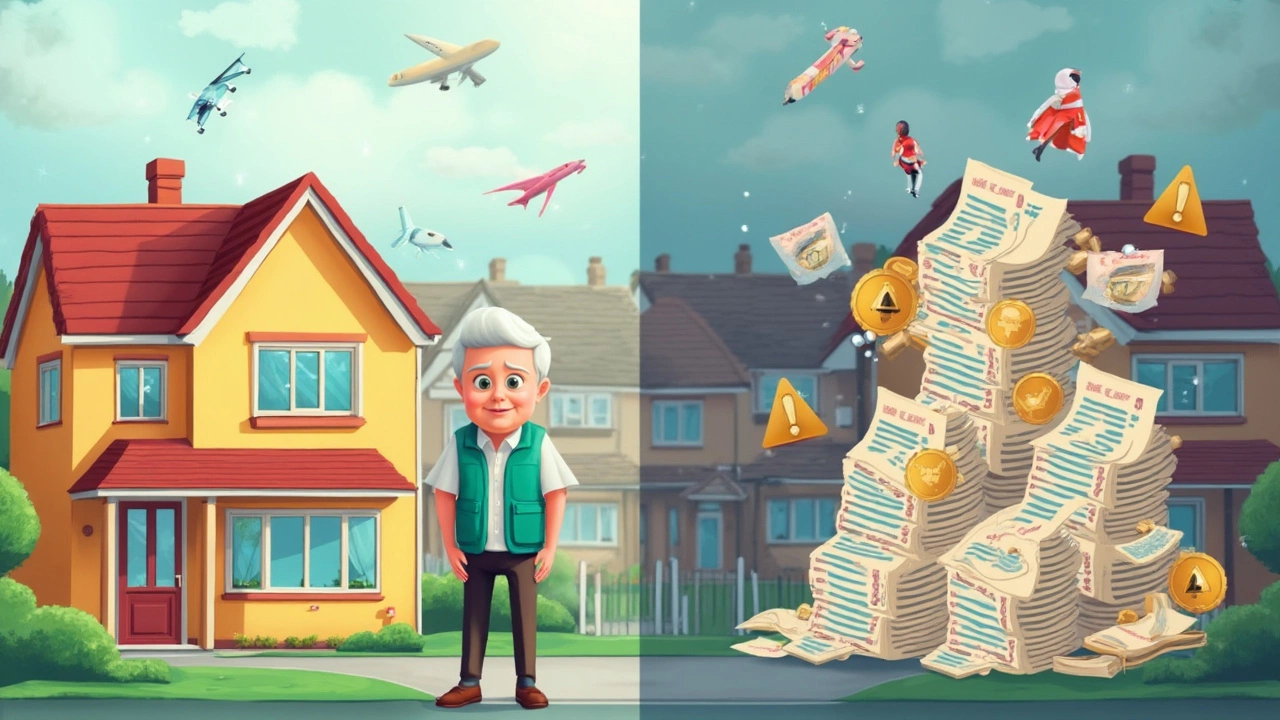Picture this: You’ve spent decades paying down your mortgage, and now your house is worth more than ever—maybe double or triple what you paid. Now, bills seem endless, pensions barely stretch, and your savings feel like they're vanishing. If you own your home, you might be tempted by ads promising to turn bricks and mortar into quick cash. But is equity release really a lifeline or just a nice-sounding trap? Understanding this decision matters more than ever, especially now that UK house prices have jumped more than 25% in the last five years according to Halifax. It’s easy to be drawn in, but you need to know exactly what you’re signing up for. Let’s cut through the noise and take a real look at what equity release is, what it’s not, and whether it fits with your life goals.
How Does Equity Release Really Work?
If you’re 55 or older and you own your home (with or without a mortgage), equity release is a way to unlock some of that value as tax-free cash. The money isn’t just handed over with a handshake, though. Underneath, there are two main routes: a lifetime mortgage and a home reversion plan. Here’s where things start to get interesting (and honestly, a bit complicated).
Lifetime mortgage is what most folks go for—over 90% of plans are these, according to the Equity Release Council’s 2024 report. With this option, you borrow against your home’s value, keep full ownership, and usually pay nothing back until you die or go into long-term care. Interest stacks up on the loan, and it compounds, which means you could owe way more than you borrowed unless you choose to pay the interest regularly. Some plans now even let you pay interest monthly, helping to keep control of the final bill.
Home reversion works differently: you sell part or all of your property to the lender at below-market value (sometimes shockingly below). But you get to live in the home rent-free for the rest of your life. When the house is sold (when you die or move out), the lender takes their share of the sale price.
It all sounds simple, but then reality hits. If you release, say, £100,000 at a fixed rate of 6% (typical in 2025), and you live twenty years, that original debt could balloon to around £320,000 because of compounding (see the table). Suddenly, a big chunk of your home’s value goes from your kids’ hands to the lender’s pocket. Not exactly the legacy most people hope for. But on the other hand, that windfall might unlock years of comfort in retirement or finally fix up the kitchen you’ve hated since 1982.
Let’s see how equity release stacks up on real, cold numbers:
| Amount Released (£) | Interest Rate (%) | Years Remaining | Amount Owed (£) |
|---|---|---|---|
| 50,000 | 6 | 10 | 89,542 |
| 100,000 | 6 | 20 | 320,713 |
| 75,000 | 5.5 | 15 | 167,264 |
That table says it all: compounding is not your friend unless you’re the lender! So it’s worth asking yourself—"How much cash do I really need right now?" because every £10,000 today could mean £30,000 less for your family down the line. But if the extra money means you get to actually enjoy your retirement—take those trips, remodel your home, help grandkids with uni—maybe it’s a price worth paying.

Who Benefits Most (and Least) From Equity Release?
Not every homeowner is a good candidate, and this isn’t a one-size-fits-all tool. People with few savings but lots of home equity are the classic winners here. They turn illiquid wealth into spendable funds. For example, a 2023 Age UK study showed a third of over-65s have property worth more than £300,000, but many live on a state pension of less than £10,000 a year. Equity release can make a dramatic difference—covering care fees, wiping out debts, or even gifting a deposit for a child’s house.
But there are clear downsides. Do you have children or loved ones hoping for an inheritance? The value of your estate shrinks fast with interest rolling up. Are you thinking of moving in the future, maybe to be closer to family? Releasing equity locks you in; selling up later can trigger £thousands in fees or force you to repay everything at once. What about your benefits? Money you release could nudge you over the threshold and cut support like pension credit or council tax reduction. Suddenly, that cash boost hurts more than it helps.
Here are a few situations where equity release can make sense:
- You’re single and want to spend your money, not worry about inheritance.
- Major home repairs or renovations are urgent, especially if it keeps you safe at home.
- You need to pay off an interest-only mortgage coming due and don’t want to move.
- Your pension income barely covers essentials, and you want to afford small luxuries or travel.
On the flip side—maybe it’s not a good move if:
- You have plenty of savings or other assets you can use first.
- You want to move or downsize in the next few years.
- Family inheritance is your top priority.
- You live in a property that’s tricky for lenders—like a rural cottage, leasehold flat, or listed building. You could get rejected or face higher fees.
Surprising fact: according to MoneyHelper, some older homeowners who did equity release later regretted losing state benefits or felt pressure to spend money quickly, thinking it was free. Others, though, felt it gave them real freedom and independence. No two people walk away with the same experience, so thinking hard about your true priorities and needs is key.

What Are the Alternatives and Pitfalls to Watch?
Before you rush for that tax-free cash, think about other, possibly better, options. Downsizing is the old-school alternative—it’s not glamorous, but it frees capital without the snowballing interest. With the average UK home worth £288,000 in 2025 (ONS), selling a four-bed and moving to a two-bed can leave you with a tidy sum even after moving costs. You just need to be ready for the emotional wrench—and the hassle of finding somewhere you actually like.
Remortgaging is another choice, though harder now if you’re retired or on a low income. Some lenders have special later life mortgages with fixed repayments, so you keep the debt from ballooning. Family loans, renting out a room, or using government support (like council grants for energy improvements) are all worth exploring ahead of equity release.
Here’s a quick rundown of risks you really can’t ignore:
- Compounded interest: Your debt grows year on year, potentially eating up most of the value of your home.
- Reduced inheritance: Your family could inherit little or nothing, especially if house prices fall.
- Loss of flexibility: Want to move? It may not be easy or affordable unless your plan lets you transfer the loan—which is never guaranteed.
- Impact on benefits: Large lump sums in your bank can mean losing help with bills or care costs.
- Early repayment charges: Many equity release deals lock you in, and paying back early can mean penalties up to 25% of your loan.
A few golden tips if you do look at equity release:
- Only use plans with "no negative equity" guarantees (this stops you owing more than your home is worth).
- Ask about drawdown options—taking cash as you need it, rather than one big sum, can keep interest lower.
- Always get independent financial advice—only advisors on the FCA register can sell equity release, so don’t skip this step.
- Get your family involved if inheritance matters to you—open conversations save heartache down the line.
Bottom line? Equity release is neither a hero nor a villain—it’s a tool, but it’s not a magic one. For some, it’s the best way to unlock decades of hard-earned wealth and create the life they want in retirement. For others, it’s just not worth the cost. The smart move is knowing the details, looking at all your options, and getting expert advice so you make the choice that’s truly right for you.
